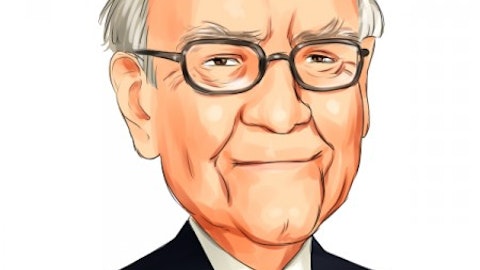Dividend Growth Score
Our Growth Score answers the question, “How fast is the dividend likely to grow?” It considers many of the same fundamental factors as the Safety Score but places more weight on growth-centric metrics like sales and earnings growth and payout ratios. Scores of 50 are average, 75 or higher is very good, and 25 or lower is considered weak.
Deere’s Dividend Growth Score of 46 suggests that the company’s dividend growth potential is close to average. The company’s reasonable payout ratios and excellent cash flow generation are being offset by deteriorating near-term business trends.
Looking longer term, Deere has increased its dividend for 12 consecutive years and paid uninterrupted dividends since 1988. We are not sure if Deere will eventually qualify to join the dividend aristocrats list, but its dividend growth has certainly been impressive.
The company’s quarterly dividend has about quadrupled over the last decade from 16 cents per share in 2005 to 60 cents today.
However, as seen in the table below, Deere’s dividend growth rate has decelerated from 15% per year over the last five years to a high-single digit rate more recently.
The company has also held its dividend flat at 60 cents per share for eight straight quarters as it deals with the numerous macro headwinds that are reducing its profits.

Source: Simply Safe Dividends
Deere’s dividend growth rate will likely remain low until agriculture fundamentals improve. However, once the macro environment is more favorable, the company’s dividend has nice potential to continue growing at a mid- to high-single digit rate.
Valuation
Deere trades at a forward price-to-earnings multiple of 20.2 and has a dividend yield of 2.9%, which is somewhat higher than its five-year average dividend yield of 2.4%.
While the company’s earnings multiple doesn’t look cheap at first glance, cyclical companies usually look expensive near the bottom of their cycles and cheap near the top.
Deere’s earnings have contracted significantly in recent years as the agricultural cycle turned down. Investors are anticipating better profits in future years.
Even despite the macro headwinds faced by Deere, the company has still compounded its diluted earnings per share by 5.8% over the last five years.
While trends could get worse before they get better, we ultimately believe Deere’s earnings can continue to compound at a mid- to high-single digit rate over the long term. Agriculture demand should continue rising over time, and Deere seems likely to continue dominating the market and steadily repurchasing its shares each year.
Under these assumptions, Deere’s stock appears to offer annual total return potential of 9-12%.
Management also issued a target for 2018 to generate $50 billion revenue and earn a 12% operating margin. Assuming the company continues repurchasing its shares each year and pays taxes at a 35% rate, Deere’s earnings seem likely to exceed $12 per share under management’s goals.
If this played out and Deere traded at 13x earnings in 2018, the stock would fetch a price of about $150 per share – nearly double where Deere’s stock is trading at today.
Macro weakness makes Deere’s 2018 sales goal look increasingly unlikely, but the company’s long-term earnings power is still strong once the agriculture cycle begins recovering sometime in the future.
Barring a 1980s type of farm crisis, which seems very unlikely in our view, Deere’s stock appears to be reasonably priced for long-term investors.
Conclusion
Deere & Company (NYSE:DE) is a wonderful business that is sensitive to a number of factors outside of its control. Weak crop prices, the strong dollar, declining farm economics, and sluggish global growth are all hurting demand for the company’s large equipment.
However, Deere’s economic moat and long-term earnings power remain largely intact. Like Warren Buffett, we enjoy buying blue chip dividend stocks when they are on sale and holding onto them indefinitely. Buffett actually increased his stake in Deere during the fourth quarter of 2015, which suggests he sees value in Deere at its current stock price.
Follow Warren Buffett's Berkshire Hathaway
Several of the companies we already own in our Top 20 Dividend Stocks portfolio overlap with Deere, but this is a remarkable business that we will certainly keep our eyes on.
Disclosure: None




